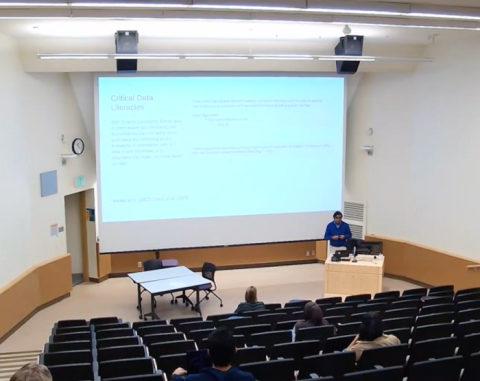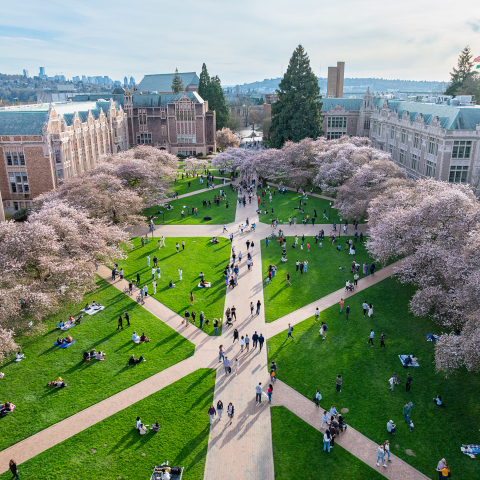In the University of Washington's Department of Human Centered Design & Engineering (HCDE), research is deeply interdisciplinary, impact-driven, and rooted in people’s lived experiences. HCDE faculty and students investigate the ways technology shapes—and is shaped by—human needs, behaviors, and communities.
Research clusters
HCDE’s Research Clusters are collaborative focus areas that reflect major themes in the department’s work.
Research collaboration
Autumn 2025
HCDE Research Speaker Series
Explore recent talks from the HCDE Research Speaker Series, featuring new research and perspectives from HCDE faculty and PhD students. Watch full recordings from this year’s sessions.
View the recordings
Research topics
Specific areas where HCDE faculty are advancing knowledge and design practice.
Research that aims to lower barriers to technology use and information access.
Affiliated faculty:
Research to support the development of tools and technology for arts practice.
Affiliated faculty:
Research to develop tools and methods that help people analyze, interpret, and work with data.
Affiliated faculty:
With the goal of strengthening democracy and trust, our scope includes research on human interaction in digital spaces, platform design to foster safe and trustworthy spaces, promote community formation, and trustworthy ecosystems.
Affiliated faculty:
Research in engineering education and learning, research in education design, and system and technology development to promote education outcomes.
Affiliated faculty:
Research to design systems and tools to address energy challenges.
Affiliated faculty:
Research to support collaborative engineering.
Affiliated faculty:
Research that prioritizes individual and social wellbeing in entrepreneurship and business strategy.
Affiliated faculty:
Research to design systems and tools to address environmental challenges; research and design with communities that are historically excluded from technology and service design, resulting in ongoing harms.
Affiliated faculty:
Evaluating and developing tools and technologies to promote individual and population health and wellbeing. Includes mental health.
Affiliated faculty:
Research that enables people to explore and gain insight from machine learning models and vast data sets, while also considering social impacts such as privacy, security, ethics, and mis/disinformation.
Affiliated faculty:
Research that includes studying and developing informational, physical, and social infrastructures - systems that are shaped by collaborations and that in turn shape collaborations.
Affiliated faculty:
Research scope includes unconventional digital fabrication tools, small scale automation, networked control systems, advanced manufacturing, and digital twins/simulation.
Affiliated faculty:
Research to support how people access, interpret, and engage with scientific information.
Affiliated faculty:
Research to develop and enable robots to perform increasingly difficult tasks, and work collaboratively with humans rather than independently.
Affiliated faculty:
Research that enables humans to explore and gain insights from technology while also considering social impacts such as safety, privacy, security, ethics, and information integrity.
Affiliated faculty:
Research to support how scientists collaborate, share data, and work across teams and disciplines.
Affiliated faculty:
Research to develop methods and approaches for designing effective, human-centered services.
Affiliated faculty:
- Tyler Fox
- Julie Kientz
- Charlotte Lee
- Sean Munson (health focus)
Research focused on understanding and designing technologies for social movements
Affiliated faculty:
Research focused on understanding and designing for online communities and social media.
Affiliated faculty:
Research to understand and support the complex sociotechnical systems that support people and society.
Affiliated faculty:
Research to design systems and technologies that improve transportation.
Affiliated faculty:
Research focused on technology design and implementation for drinking water treatment and water resources more generally.
Affiliated faculty:
Research impact
HCDE impact
From clean water to clean energy, mental health to AI literacy, HCDE researchers are applying human-centered methods to some of society's most pressing challenges. Learn more about the power of academic research and how federal funding helps advance knowledge that serves communities locally and nationally.
Explore HCDE impact